
Palm Sunday Sermon
Pastor Rich Knight
Central Congregational Church
March 28, 2018
Matthew 21:1-17
Jesus chose this day to ride into Jerusalem. You’ll hear in the account that he carefully orchestrated it. One of the reasons he likely chose this day was that Jerusalem would have been filled with people – because Passover was approaching – just 4 days away. Passover of course was & is the most important festival within Judaism. In ancient times Jews living within 20 miles of Jerusalem were required to celebrate Passover in the holy city. Not only that, thousands of Jews made pilgrimages to Jerusalem every year to celebrate the festival there. About 30 years after this account, a Roman Governor did a census of Jerusalem during a Passover of his day, and he estimated there were over 2 million people there during these holy days. Even if that’s wildly exaggerated, it still suggests that many, many people witnessed the events of this day and this week. Let’s take a look:
Matthew 21:1-17
When they had come near Jerusalem and had reached Bethphage, at the Mount of Olives, Jesus sent two disciples, saying to them, “Go into the village ahead of you, and immediately you will find a donkey tied, and a colt with her; untie them and bring them to me. If anyone says anything to you, just say this, ‘The Lord needs them.’ And he will send them immediately.” This took place to fulfill what had been spoken through the prophet, saying, “Tell the daughter of Zion, Look, your king is coming to you, humble, and mounted on a donkey, and on a colt, the foal of a donkey.” The disciples went and did as Jesus had directed them; they brought the donkey and the colt, and put their cloaks on them, and he sat on them. A very large crowd spread their cloaks on the road, and others cut branches from the trees and spread them on the road. The crowds that went ahead of him and that followed were shouting, “Hosanna to the Son of David! Blessed is the one who comes in the name of the Lord! Hosanna in the highest heaven!” When he entered Jerusalem, the whole air jordan 5 el grito release date sept 2024 hf8833 city was in turmoil, asking, “Who is this?” The crowds were saying, “This is the prophet Jesus from Nazareth in Galilee.”
Then Jesus entered the temple and drove out all who were selling and buying in the temple, and he overturned the tables of the money changers and the seats of those who sold doves. He said to them, “It is written, ‘My house shall be called a house of prayer’; but you are making it a den of robbers.” The blind and the lame came to him in the temple, and he cured them. But when the chief priests and the scribes saw the amazing things that he did, and heard the children crying out in the temple, “Hosanna to the Son of David,” they became angry and said to him, “Do you hear what these are saying?” Jesus said to them, “Yes; have you never read, ‘Out of the mouths of infants and nursing babies you have prepared praise for yourself’?” He left them, went out of the city to Bethany, and spent the night there.
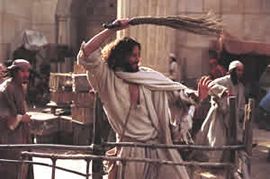
“And making a whip of cords, he drove them all out of the temple, with the sheep and oxen style. And he poured out the coins of the money-changers and overturned their tables. – John 2:15
I’d like you to think about something this morning. It’s this: Jesus was a dangerous man.
We have so domesticated Jesus. We’ve painted a picture of him as totally meek and mild, gentle and whimpy. He’s Mr. Rogers in a Robe – just a really nice guy, who went around telling everyone to be really, really nice. But as Philip Yancy says,
“How would telling people to be nice to one another get a man crucified? What government would execute Mister Rogers or Captain Kangaroo?”
Jesus was a dangerous person. In his fascinating jordan 1 mid linen book, Wild at Heart, John Eldredge says Jesus was more like Braveheart than Mr. Rogers. Eldredge tells the story of that scene in “Braveheart” (based on an actual historical person) where Air Jordan 1 Retro High Top 3 William Wallace rallies his wild band of brothers with a very stirring speech:
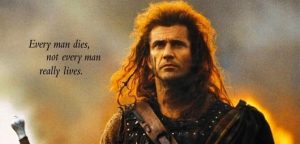
“Sons of Scotland . . . you have come to fight as free men, and free men you are.” Let us tell our enemies that “they may take our lives, but they’ll never take our freedom!”
At the end of the speech as the men are cheering, and Wallace’s friend says to him,
“Fine speech. Now what do we do?”
“Just be yourselves.”
“Where are you going?” he asks.
“I’m going to pick a fight.”
Believe it or not, that’s Jesus on Palm Sunday, a Warrior going to pick a fight.
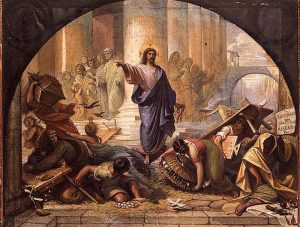
If you’re familiar with the accounts of his life you know that this isn’t the first time Jesus has picked a fight. In Luke 13 Jesus was teaching in a synagogue, and there’s a woman there who’s had an affliction for 18 years. Jesus wants to heal her. He knows that the religious authorities believed it was wrong to heal on the Sabbath day, because in their minds healing was working. They would then accuse him of deliberately breaking the 4th commandment. Jesus could have said, “Ma’am, come back tomorrow and I’ll heal you. It’s been 18 years. What’s one more day?” or “Can I talk to you later?” He could have healed her in private, but instead he picked a fight and healed her right there in the synagogue in front of the authorities.
In Mark 2 Jesus & his disciples are taking a walk on the Sabbath and they’re hungry, but some Pharisees are watching. Jesus could have said, “Hey, don’t pick anything from the field. It’s the Sabbath. We shouldn’t harvest on the Sabbath. It’s wrong and we’ll get yelled at.” But instead he lets his disciples pluck off a few heads of grain to eat along the way. He picks a fight.
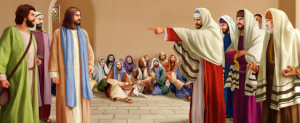
In the parable of the Good Samaritan he slams the religious authorities of his day. The priest and the Levite walk by on the other side of the road, ignoring the wounded man lying there. The hero of the story is a lowly half-breed Samaritan, who’s closer to God than the pure-blooded religious people. Jesus was picking a fight. He was a dangerous man. Palm Sunday begins the biggest battle of them all.
As I mentioned, Jesus planned it all out. It was not a sudden decision or a haphazard act. He had the donkey all lined up – “Go into the village. Find the donkey. ‘Tell them, “The Lord needs it.’” That’s the password (how cool is that that our Lord uses passwords?)
And he picks the day because it will not go unnoticed. The largest crowds of the year will be there. And some in those crowds believe he’s the Messiah, the long-awaited Savior. They’ve heard of his miracles. Perhaps many of them witnessed the miracles – countless healings, casting out demons, feeding 5000 people, even raising the dead (Lazarus). This had to be the Messiah. But the religious authorities are convinced that he’s not the Messiah – he’s too much of a rebel for that.
Jesus knows his Bible, the Hebrew scriptures, and he knows that it says that the Messiah will enter Jerusalem on a donkey (Zech. 9:9). Hey, if you’re going to claim to be the Messiah, you might as well go all the way with it. “I’m going to pick a fight.”
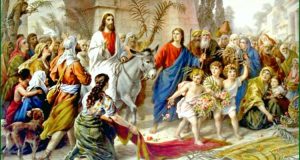
Do you see, not only the courage and conviction of Jesus, but do you see his audacity? – his outrageousness? – his holy defiance?
The crowds of course are eager for the Messiah – “Hosanna in the Highest!” they shout. It becomes air jordan 1 low outlet quite a spectacle, which only angers the authorities more. And then to add defiance to defiance Jesus goes into the Temple Courts and trashes the place. Do you think that got noticed? Do you think he made a good impression with those in charge of the Temple? Would Mister Rogers have done something like that? No, but Braveheart would.
We have ancient Roman writings that say that the Temple in Jerusalem was one of the most magnificent buildings in all the world. So this act of Jesus would be like some young religious rebel going in and trashing the Vatican.
He overturned the tables of the money-changers. The Money-Changers helped people pay their yearly temple tax by exchanging the various currencies brought into the temple into the proper currency needed to pay the tax. But the Money-Changers charged exorbitant prices. So did the merchants selling doves which were to be sacrificed in the temple. They charged the people outlandish prices for the doves, which could only be purchased inside the Temple. The prices were often marked up 10-20 times higher. So these merchants and the money-changers had turned the Temple into a money-making business and did so by abusing the people financially, thus making it very hard for common people to practice their faith. It also ruined the spiritual nature of the Temple itself. So Jesus cries out: “My Father’s House is to be a house of prayer, but you have made it into a den of robbers.”

He came to pick a fight – a fight against the religious practices of his day that were often legalism with no Life from above. In many ways it was religion without grace, without soulfulness. And we know from our own history (think, Witch Trials), when religious people lose their souls, much harm is done. Jesus came to confront that and to lead people back to God. It was a battle, but he was a warrior.
There were more battles to be fought in the week ahead. On Thursday night he fought a battle with the Tempter. Fearing his death Jesus prayed: “Lord, if there’s any other way to do this, let this cup pass from me. Nevertheless, not my will be done, but Thy will be done.”
The biggest battle would be fought on Good Friday. Robert Bly says, “In every relationship something fierce is needed once in a while.” Something fierce happened on Good Friday. It was a battle of light and darkness, of love vs hate. And Jesus the Holy Warrior of God was up to the task.
Let me begin this final section by asking a question or two:
Are we ever dangerous? Jesus was a dangerous man. Is the church that bears his name ever dangerous in the world today? – in a good and holy way – are we ever dangerous? or do we just uphold the status quo and choose not to rock the boat?
One of the things I like about our religious tradition it that we were willing to be dangerous.
A. The Congregationalist preacher/evangelist Charles Finney was an abolitionist long before it was popular. He refused to give communion to slave owners. He felt it would make communion a joke, since they’re weren’t even trying to follow Christ.
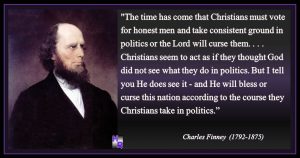
B. Our denomination ordained women to the ministry over 165 years ago (Rev. Antoinette Brown in 1853), when no one else believed it was the right thing to do. Think about that! Half of the Christian churches in this country still won’t allow a woman to stand in the pulpit or at the communion table, and we did it during the horse & buggy age!!!
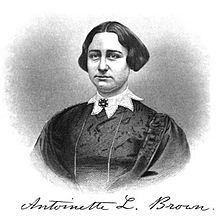
C. Our denomination was part of the Civil Rights movement from the earliest days, when it was dangerous to do so. Andrew Young was sent by our Homeland Mission Board to work with Martin Luther King, Jr. In fact, Young was on the balcony of the hotel in Memphis when Dr. King was assassinated.
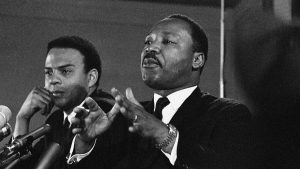
D. Our denomination expressed grace and acceptance to gays and lesbian folks decades before society became more gracious. We ordained an openly gay man in 1972, Rev. William R. Johnson.

What dangerous things might God be calling us into today?
Here’s one other way to think about this: Is there anything dangerous about our spirituality and discipleship?
Howard Macey says, “The spiritual life cannot be made suburban. It is always frontier and we who live in it must accept and even rejoice that it remains untamed.”
John Eldredge puts it this way: “There are no formulas with God. Period. So there are no formulas for the man who follows him. God is a Person, not a doctrine. He operates not like a system – not even a theological system – but with all the originality of a truly free and alive person.”
“The realm of God is dangerous,” says Archbishop Anthony Bloom. “You must enter into it and not just seek information about it.”
So let’s seek the Kingdom of God this morning and this week, as we follow a Dangerous and Holy Savior.
Amen.
